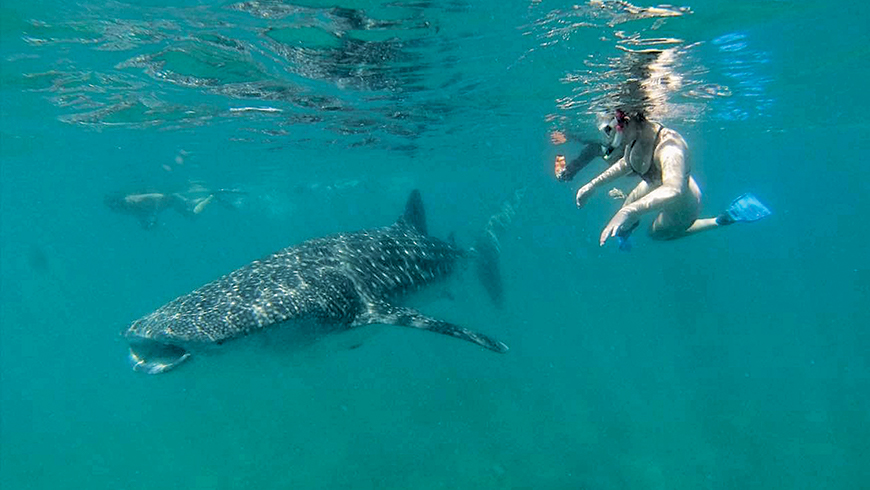High School: The Sage School
Plans for next year: St. Martin’s University
Project Title: Diving Deeper: A Study of Connections to the Ocean
Lily Roebuck has always been struck by the ocean’s power. She decided to explore the human connection to the ocean in her project. Her research led her to the thesis: “Humans have emotional and spiritual connections to the ocean, however, we favor the utilitarian view.”
Excerpts from Lily’s presentation:
I was sitting 40 feet below the surface, on the sandy ground of the ocean, breathing through my regulator, being held down by the weights around my waist. Suddenly my instructor, Roy, gave the signal for shark and pointed out into the darker waters.
… First there was only one, a little smaller, but still large enough to swallow me whole. … Suddenly there were two in sight, then three, coming in and out of view. After about fifteen minutes of sitting on the ground, there were four bull sharks; large and unafraid of me …. The sharks circled, close enough for me to reach out and touch one. In this moment I noticed something, I was the most calm I had ever been … I was finally able to see what goes on underwater. This wasn’t the only time that I felt deeply connected to the ocean, but it was one of the most profound…
There were three connections that led my research: emotional, spiritual, and utilitarian. Emotional meaning a bundle of subjective feelings that comes together to create a bond between two things. Spiritual is when two things are connected at the heart and has a spiritual union felt both physically, mentally and at other levels. And utilitarian is designed to be useful or practical and harnesses all uses of an object and relies on those for life.
… An emotional connection to the ocean doesn’t have a right or wrong way of feeling it. The emotional connection can be in the form of happiness, of curiosity, of fear, of bewilderment … Wallace Nichols writes in an article, “in most cases, when humans think of water- or hear water, or see water, or get in water, even taste and smell water—they feel something.”
… In all of the conversations I had, and all the interviews I conducted, not one person said that they didn’t feel something when around the ocean. Almost 70 percent of people, who completed my survey, said that they believe they share an emotional connection with the ocean, 20 percent checked both spiritual and emotional, and the last 10 percent said only spiritual. Not one person said they had a utilitarian connection.
… The downfall of the emotional connection is that it can easily be misinterpreted … people (can mistake) an emotional connection for that of a utilitarian one…
There are six oilrigs off the coast of Santa Barbara, and are all visible from shore. When asked how they felt about the oilrigs, most responded with … something along the lines of, “they don’t bother me. I love the ocean, and I want to keep it clean, but we are benefiting so much from them. They can’t remove them.” When looking through their surveys … almost all who said they don’t have a problem with the oilrigs also checked that they feel they have an emotional connection. If this confusion continues to happen, more and more people will lose sight of their emotional connection in favor of the utilitarian.
… A spiritual connection to the ocean is like how E.O. Wilson explains biophilia, a word he created to describe his theory that, “humans have ingrained in our genes an instinctive bond with nature and the living organisms we share our planet with.” This spiritual … is in our DNA, it’s part of who we are, it originates all the way back to where we came from some 375 million years ago.
What I experienced scuba diving in Mexico helped me understand my connection to the ocean, and even furthered it. When I was diving, I was present, I was at peace, I had no fears, no regrets, no worries. …(F)or the first time in a long time, I wasn’t afraid to be in the ocean, subject to anything swimming up behind me, or a big current taking me far away. I was in a state of mind that I was part of the system underwater. I wasn’t intruding, I wasn’t invasive, or a distraction. I was just one of the fish.
…Why does all this matter? I live 600 miles away from the ocean … I focused on the connections to the ocean because I believe that if we keep favoring our utilitarian view … if we keep putting our trash in the oceans, if we continue to over-fish, to keep adding to our pollution, there will be nothing left of any life. Rachel Carson writes, “It is a curious situation that the sea, from which life first arose should now be threatened by the activities of one form of that life. But the sea, though changed in a sinister way, will continue to exist; the threat is rather to life itself.” Our lives depend on the ocean, we get three-quarters of our oxygen from algae in the ocean, and one in six people receive all of their protein from the water. We need the ocean to survive, and in order for us to stop abusing it’s resources; we need to reestablish our emotional and spiritual connections, even if we live 600 miles away.


